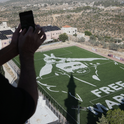Professor Ilan Pappé doesn’t look like a rebel. At 70, the Israeli historian has friendly blue eyes, white hair and a ruddy complexion. The collar of his shirt is unbuttoned and his sleeves are rolled up on this hot April day in Cambridge, where he is due to give a talk at the city’s literary festival.
Born in Haifa six years after the creation of the Israeli state, Pappé had a “very conventional Israeli Jewish childhood”. At 18, he was drafted into the Israeli Defense Forces and fought in the Fourth Arab-Israeli War (“it’s a period I try to forget.”)
In the 1980s, he became part of a group of scholars—later termed Israel’s “new historians”—allowed access to a set of newly declassified documents around the 1948 Palestine war. His time in the archives and speaking to Palestinians “contradicted most of the things that I heard in school,” and put him at odds with friends, family and colleagues. “It’s not a normal thing to do”, he admits, “you want to belong.”
Pappé, who cracks jokes and is quick to smile, strikes me as a person who might easily belong. Instead, he’s been condemned in the Knesset and Israeli press and boycotted by his own university.
By nature I’m a pacifist. But I’m not deluding myself
As a professor at Haifa University, he began backing an academic and cultural boycott of his homeland, arguing that external pressure was the only way to end Israel’s occupation of Palestinian territories. He’s been called a “charlatan” and a “traitor”, at one time receiving near-daily death threats. In 2007, he left Israel for a position at the University of Exeter.
Pappé is the son of German Jews who escaped the Nazis in the 1930s. His background made him “more aware of victimisation and injustice”. But his views clashed with those of his parents, who, he believes, couldn’t see that their haven was predicated on the ethnic cleansing of Palestinians.
Central to his thinking is the idea that “Zionism was a European solution for a European problem... it was very clear from the very beginning that this was a project that could only be done by force, both to create it [and] to sustain it.
“The longer the project exists and thrives, the more the resistance to it intensifies. [The project] also becomes more violent, because it needs more violence to be sustained.”
On the 7th October attacks, and Israel’s retaliation, “the one thing that surprised me”, he says, “was the European indifference to the Israeli genocide.”
Pappé has been describing Israeli policies towards Gaza as “incremental genocide” since 2006, and has accused Israel of implementing settler-colonialism and apartheid. While various human rights organisations describe the assault on Gaza as genocide, the International Court of Justice has yet to rule on the genocide case brought by South Africa. Pappé insists on these terms, arguing “the British media has a vocabulary that obfuscates the reality”. He calls the BBC “outrageous… it prides itself under the idea that it is balanced. But in a genocide, there are no two sides”.
“By nature I’m a pacifist”, he muses, but “I’m not deluding myself that such an oppressive reality can be changed just by nice words and conversations.”
He still goes to Israel to visit family and friends, many of whom are Arab-Israelis. “I am always worried when I’m there that they might arrest me.” In May last year, he was detained by Homeland Security in the US.
But Pappé is scathing of those who avoid speaking due to fear. “They know exactly what goes on, but they’re afraid to say it. That’s worse than people who don’t know.” Does he consider himself radical?
“No, not really.” He thinks for a moment. “I consider myself as a normal human being that fights against what is abnormal. So not a radical, no.”












